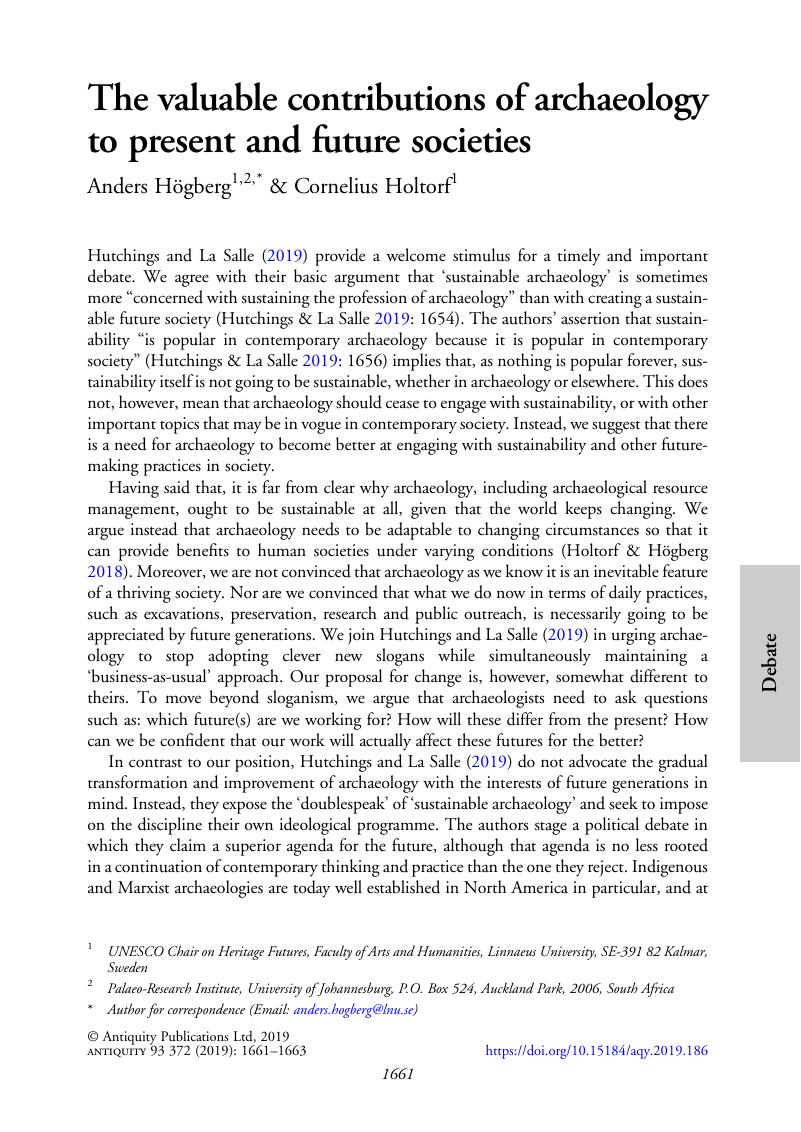Hutchings and La Salle (Reference Hutchings and La Salle2019) provide a welcome stimulus for a timely and important debate. We agree with their basic argument that ‘sustainable archaeology’ is sometimes more “concerned with sustaining the profession of archaeology” than with creating a sustainable future society (Hutchings & La Salle Reference Hutchings and La Salle2019: 1654). The authors’ assertion that sustainability “is popular in contemporary archaeology because it is popular in contemporary society” (Hutchings & La Salle Reference Hutchings and La Salle2019: 1656) implies that, as nothing is popular forever, sustainability itself is not going to be sustainable, whether in archaeology or elsewhere. This does not, however, mean that archaeology should cease to engage with sustainability, or with other important topics that may be in vogue in contemporary society. Instead, we suggest that there is a need for archaeology to become better at engaging with sustainability and other future-making practices in society.
Having said that, it is far from clear why archaeology, including archaeological resource management, ought to be sustainable at all, given that the world keeps changing. We argue instead that archaeology needs to be adaptable to changing circumstances so that it can provide benefits to human societies under varying conditions (Holtorf & Högberg Reference Holtorf, Högberg and Smith2018). Moreover, we are not convinced that archaeology as we know it is an inevitable feature of a thriving society. Nor are we convinced that what we do now in terms of daily practices, such as excavations, preservation, research and public outreach, is necessarily going to be appreciated by future generations. We join Hutchings and La Salle (Reference Hutchings and La Salle2019) in urging archaeology to stop adopting clever new slogans while simultaneously maintaining a ‘business-as-usual’ approach. Our proposal for change is, however, somewhat different to theirs. To move beyond sloganism, we argue that archaeologists need to ask questions such as: which future(s) are we working for? How will these differ from the present? How can we be confident that our work will actually affect these futures for the better?
In contrast to our position, Hutchings and La Salle (Reference Hutchings and La Salle2019) do not advocate the gradual transformation and improvement of archaeology with the interests of future generations in mind. Instead, they expose the ‘doublespeak’ of ‘sustainable archaeology’ and seek to impose on the discipline their own ideological programme. The authors stage a political debate in which they claim a superior agenda for the future, although that agenda is no less rooted in a continuation of contemporary thinking and practice than the one they reject. Indigenous and Marxist archaeologies are today well established in North America in particular, and at the same time they are anything but timeless. The strict division that Hutchings and La Salle (Reference Hutchings and La Salle2019) present between archaeological practices, such as cultural resource management on the one hand and the conservation of cultural heritage and well-being of affected communities on the other, is unhelpful. So here is a critical question for Hutchings and La Salle: why are your political preferences and your view of the field of archaeology less time-bound and less problematic than any other?
Understanding cultural heritage primarily in terms of essentialising identities and the property rights of local communities based on descent—as has become common over the past decades—is arguably counterproductive and compromises human wellbeing and social justice. It risks creating or reinforcing boundaries that prevent social cohesion in societies of coexisting communities. A future archaeology that is aware of the increasing relevance of this problem may prefer to minimise the role of heritage in establishing any confining affiliations along racial, religious, ethnic or other strong lines of division. That would be an archaeology that does not seek to strengthen identities by ascribing exclusive heritage to individuals or groups, but that actively looks for new approaches and alternative heritage practices (e.g. Högberg Reference Högberg and Meier2006, Reference Högberg2016; Holtorf Reference Holtorf2017, Reference Holtorf2018; Holtorf & Högberg Reference Holtorf, Högberg and Smith2018). One concrete example is provided by Hodder's (Reference Hodder2010) call for heritage rights that are based on social justice and wellbeing, rather than ownership and descent. He proposes to include duties to others into these rights, and suggests the formulation that “everyone has a right to participate in and benefit from cultural heritage that is of consequence to their well-being, and everyone has a duty towards others with respect to that right” (Hodder Reference Hodder2010: 876). This is an excellent example for the kind of rethinking necessary for heritage to provide sustainable benefits for people and societies now and in the future.
Based on our experiences in Europe (Högberg & Fahlander Reference Högberg and Fahlander2017; see also Ravn Reference Ravn2013), we are not persuaded that archaeology, through its involvement in development, is necessarily “complicit in the destruction of life-sustaining ecosystems and communities” (Hutchings & La Salle Reference Hutchings and La Salle2019: 1657). Nor do we agree that archaeology's involvement in the market economy necessarily means that it is directly involved in exploitative capitalism or even constitutes a form of ‘state heritage crime’. In our view (see also Holtorf Reference Holtorf2009), such formulations risk undermining opportunities for archaeology to make valuable contributions to present and future societies.





